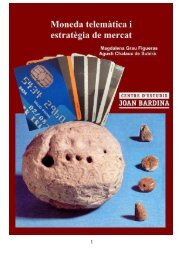Telematic currency and market strategy (mtemuk.pdf). - Centre d ...
Telematic currency and market strategy (mtemuk.pdf). - Centre d ...
Telematic currency and market strategy (mtemuk.pdf). - Centre d ...
You also want an ePaper? Increase the reach of your titles
YUMPU automatically turns print PDFs into web optimized ePapers that Google loves.
Especially here the present money system is at fault: because there is a lack of the proper documentation.<br />
In the money systems which are in force, instruments-documents are coins <strong>and</strong> scriptural instruments, as we<br />
know. But all these instruments are of a nature essentially anti-documentary. Rather than documenting, we<br />
might say they conceal reality, because of the following reasons:<br />
1. Mobility: they do not show only one elemental mercantile operation, as they are used for lots of<br />
exchanges: they circulate in the <strong>market</strong> indefinitely, playing their instrumental role in an unknown<br />
number of elemental exchanges. Because of this permanent mobility, it is impossible to establish<br />
exactly each of the elemental exchange operations effected.<br />
2. Uniformity: present monetary instruments, especially paper money on which all others are based, are<br />
identical to each other. Paper money changes only with respect to the number of money units<br />
represented, but gives no information with respect to special details of each elemental exchange<br />
effected. It does not say what has been exchanged, nor how, or when... This uniformity hinders any<br />
attempt to an exact analysis of the complex <strong>and</strong> flowing mercantile reality.<br />
3. Anonymity: finally, most of present day monetary instruments are anonymous, that means they do no<br />
say who are the agents in a mercantile exchange or in a monetary act whatsoever. Therefore, they do<br />
not allow the attribution of responsibility to the monetary agents, especially if we are talking of paper<br />
money. From this point of view, paper money is not only un-statistical <strong>and</strong> un-analytical, but also <strong>and</strong><br />
first of all a-social, as it allows to effect all sorts of monetary operations without leaving any<br />
personalizing <strong>and</strong> compelling evidence in the face of Justice.<br />
Even if the three above-mentioned properties can be rightly applied only to paper money <strong>and</strong> coins, it must<br />
not be forgotten that scriptural bank instruments are also essentially un-documentary, even if at first sight it<br />
might not seem so.<br />
As a matter of fact a signature on a cheque, a name, a number of account... are, to-day, identifying items. But<br />
the documentation provided is very partial, for several reasons:<br />
a. in the first place, many cheques are «to the bearer», <strong>and</strong> therefore they only identify one of the agents<br />
of the monetary exchange.<br />
b. in the second place, the information given is usually considered as a «bank secret» reserved to<br />
privileged groups <strong>and</strong> sectors: it is never made public.<br />
c. finally, because of the secondary nature of the bank-scriptural documents, they can always be<br />
converted into completely anonymous bank notes, by simply asking to do so, <strong>and</strong> therefore the<br />
identifying documentary mark is lost.<br />
Therefore, bank scriptural documents are potentially documentary; but they will not be fully such while they<br />
exist together <strong>and</strong> are subsidiary to a system of anonymous <strong>and</strong> undocumentary monetary instruments.<br />
The money system in its whole will not be a fully documentary <strong>and</strong> informative system until an identifying<br />
instrument becomes the only legal <strong>and</strong> real monetary instrument, completed in every single elemental<br />
operation <strong>and</strong> thoroughly documentary.<br />
6. Conclusions.<br />
One of the minimal conclusions, necessary to any metric system, that of possessing elemental, thorough <strong>and</strong><br />
identifying measuring documents, is not fulfilled by present day money systems.<br />
In consequence, it cannot be a good metric system. We therefore need to create a monetary instrument in a<br />
position to be a reliable guaranty of an exact measurement, <strong>and</strong> fully documentary of the exchange value of all<br />
<strong>and</strong> each of the exchanged goods in a given <strong>market</strong>.<br />
This new instrument will not be very different from present scriptural-bank instruments; but it will<br />
fulfill the traits which are now only potential, <strong>and</strong> will eliminate its metric-documentary<br />
34



